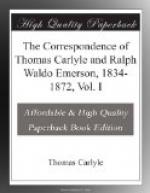illness, and had no alarm. The Doctor himself,
specially applied to, made answer as if there was no
danger: his poor Patient, in whose character
the like of that intimately lay, had rigorously charged
him to do so: her poor Daughter was far off,
confined to her room by illness of her own; why alarm
her, make her wretched? The danger itself did
seem over; the Doctor accordingly obeyed. Our
first intimation of alarm was despatched on the very
day which proved the final one. My poor Wife,
casting sickness behind her, got instantly ready,
set off by the first railway train: traveling
all night, on the morrow morning at her Uncle’s
door in Liverpool she is met by tidings that all is
already ended. She broke down there; she is
now home again at Chelsea, a cheery, amiable younger
Jane Welsh to nurse her: the tone of her Letters
is still full of disconsolateness. I had to
proceed hither, and have to stay here till this establishment
can be abolished, and all the sad wrecks of it in
some seemly manner swept away. It is above three
weeks that I have been here; not till eight days
ago could I so much as manage to command solitude,
to be left altogether alone. I lead a strange
life; full of sadness, of solemnity, not without
a kind of blessedness. I say it is right and
fitting that one be left entirely alone now and then,
alone with one’s own griefs and sins, with the
mysterious ancient Earth round one, the everlasting
Heaven over one, and what one can make of these.
Poor rustic businesses, subletting of Farms, disposal
of houses, household goods: these strangely
intervene, like matter upon spirit, every day;—wholesome
this too perhaps. It is many years since I have
stood so in close contact face to face with the reality
of Earth, with its haggard ugliness, its divine beauty,
its depths of Death and of Life. Yesterday, one
of, the stillest Sundays, I sat long by the side of
the swift river Nith; sauntered among woods all vocal
only with rooks and pairing birds.* The hills are
often white with snow-powder, black brief spring-tempests
rush fiercely down from them, and then again the sky
looks forth with a pale pure brightness,—like
Eternity from behind Time. The Sky, when
one thinks of it, is always blue, pure changeless
azure; rains and tempests are only for the little
dwellings where men abide. Let us think of this
too. Think of this, thou sorrowing Mother!
Thy Boy has escaped many showers.
--------- * “Templand has a very fine situation; old Walter’s walk, at the south end of the house, was one of the most picturesque and pretty to be found in the world. Nith valley (river half a mile off, winding through green holms, now in its border of clean shingle, now lost in pleasant woods and rushes) lay patent to the South. “Carlyle’s Reminiscences,” Vol. II. p. 137. ---------
In some three weeks I shall probably be back at Chelsea. Write thitherward so soon as you have opportunity; I will write again before long, even if I do not hear from you. The moneys, &c. are all safe here as you describe: if Fraser’s’ Executors make any demur, your Bookseller shall soon hear of it.




